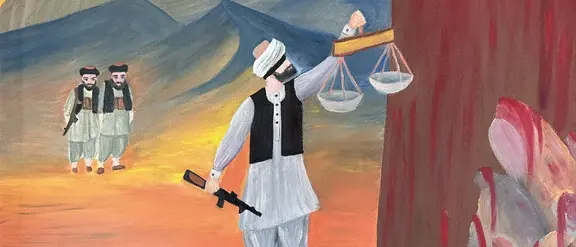Wassim was born in Jalalabad, a city in eastern Afghanistan. He grew up in a Pashtun family and had a happy childhood: "I was always out and about with my friends, cousins, and brothers—we had a really good time." But his father's work in the military entailed risks. One day, on his way home from school—Wassim was ten years old—he was brutally beaten by several unknown men: "They said to me, 'Tell your father to quit his job immediately.'"
It was clear to the family: "We had to leave, immediately, without telling anyone." They moved to Kabul. Five years later, the Taliban seized power. As they retaliated across the country, Wassim's father decided to flee as quickly as possible. "We had no passports, we had to leave illegally."
The escape led him through Pakistan to Iran. Amid the chaos at the border, he lost his family. "I never wanted to leave without my family. But the Iranian police started shooting, everyone panicked. We were separated, and I ran away. My family was arrested." He made it across the border—alone. He was 15 years old at the time.
So began an escape that took him through numerous countries for over a year - always under inhumane conditions, dependent on people smugglers, in fear of the police and without contact with his family. In Greece he was beaten by the police and deported back to Turkey, in Bulgaria he lived in forests for weeks, in Serbia in an overcrowded camp, then he was locked on the back of a truck for four days: "I wasn't dead, but I wasn't really alive either. I was something in between." His escape finally ended in Germany.
The experiences he had while fleeing still haunt him today. "I saw so many people die. Young people like me. Sometimes I think my eyes should be cameras, so that people here can see what I saw. Maybe then they would understand us."
But even though he now lives safely in Germany, his experiences and the situation in his homeland still haunt him. Wassim follows what's happening in Afghanistan: "I see on social media that young people in particular have lost hope. They have no jobs, can't say what they think, can't do what they want. Their life is like a prison, and they are forced to serve the prison guards."
The lack of prospects also affects his friends and relatives who are still in Afghanistan. "The people there are tired of life. There may not be an open war going on right now, but that doesn't mean it's safe. There are no rights, no economic security, no income—only hunger, poverty, and violence. I don't know how I would survive there."
Through his experiences on the run and his time in Germany, Wassim has developed a clear political stance: "I stand for human rights – that's the most important thing for me. I'm for women's rights, for media freedom, for civil society. I want a free life for everyone. The Taliban would never accept me as I am – how I think, how I want to live, even how I wear my hair. But I wouldn't remain silent. And I could never cooperate, spy on my neighbors, betray my friends and everything I believe in – but that's what they demand. Because of my opinions, the Taliban would arrest me; my life would be in danger. I might have already been killed."
Even in Germany, the feeling of insecurity remains his constant companion. "I'm still anxious. At school, at work, on the street—I often think, maybe the police will come and force me to go back."
Wassim dreams of graduating from school, training to be a car mechanic—and of supporting others: "I want to work, build something, help others. I have friends who, like me, fled and are so desperate that they want to take their own lives. I want to help them find meaning in their lives again."
